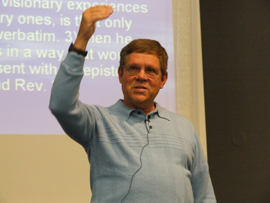 Every time I see a picture like this of Jesus and Santa Claus together, I go out of my way to say “Season’s Greetings” to a fundamentalist. I get asked quite frequently what we tell our children about Santa Claus. Our kids are a bit young so we only give them the 101 – Santa lives at the North Pole, he’s got reindeer that pull his sleigh and he gives good boys Christmas gifts and takes “Blue Bear” and “Elmo” away from the naughty boys (each family has their own traditions you know).
Every time I see a picture like this of Jesus and Santa Claus together, I go out of my way to say “Season’s Greetings” to a fundamentalist. I get asked quite frequently what we tell our children about Santa Claus. Our kids are a bit young so we only give them the 101 – Santa lives at the North Pole, he’s got reindeer that pull his sleigh and he gives good boys Christmas gifts and takes “Blue Bear” and “Elmo” away from the naughty boys (each family has their own traditions you know).
Every so often, someone either politely implies (or states matter of factly) that we are lying to our children. Perhaps in some sense this is true but when we are talking about toddlers and pre-schoolers, their reality is a bit clouded so much of the scope of truth is often irrelevant for them. However, I did see Talladega Nights and I am committed to telling them before they become race car drivers praying to the Baby Jesus (fortunately, it will be easier because they’re not being raised in the South) ;)
Still, I find myself thinking about this. We “celebrate” pretty much everything in the Ghali house because generally, it’s fun. Halloween? Absolutely. I’ve said it numerous times – getting dressed up as your favorite superhero and getting free candy from your [Read more…]
 A couple months ago, I got to hear
A couple months ago, I got to hear  Though I am not a Penn State Football fan, I am a sports fan and have always felt that Joe Paterno was an easy guy to admire. Through the years he’s carried an aura, he’s tough, he’s classy, I believe him to be a good man. it also seemed every season there were a set of stories where he went further than the game and challenged, disciplined and inspired his players to do the right thing. His discipline included public service, cleaning up the stadium after a game and benching star players on important games.
Though I am not a Penn State Football fan, I am a sports fan and have always felt that Joe Paterno was an easy guy to admire. Through the years he’s carried an aura, he’s tough, he’s classy, I believe him to be a good man. it also seemed every season there were a set of stories where he went further than the game and challenged, disciplined and inspired his players to do the right thing. His discipline included public service, cleaning up the stadium after a game and benching star players on important games. Enter Mitt Romney. He’s the GOP frontrunner. If he was smart, he’d let Tim Tebow baptize him in the Mississippi and make him his running mate. (John McCain is thinking, “Now you tell me.”) The funny thing is that some Christians don’t like Romney because he’s Mormon. There was a pastor in a big church inTexas who said that was quite outspoken against Romney’s convictions. Now from one pastor responding to another, I’d say that there are better ways of promoting your candidate of choice and it came across as an attack. It’s generally not good rhetoric that we dismiss candidates based soley on their religious beliefs. And for the sake of this post, most of us find it unfair that many do so with people like, in this case, Tim Tebow.
Enter Mitt Romney. He’s the GOP frontrunner. If he was smart, he’d let Tim Tebow baptize him in the Mississippi and make him his running mate. (John McCain is thinking, “Now you tell me.”) The funny thing is that some Christians don’t like Romney because he’s Mormon. There was a pastor in a big church inTexas who said that was quite outspoken against Romney’s convictions. Now from one pastor responding to another, I’d say that there are better ways of promoting your candidate of choice and it came across as an attack. It’s generally not good rhetoric that we dismiss candidates based soley on their religious beliefs. And for the sake of this post, most of us find it unfair that many do so with people like, in this case, Tim Tebow. I watched every show of this third season, including this past week’s reunion show. It was all pretty regrettable with bits of entertainment. Now, I sleep at night believing these people are not real, but rather, characters based on caricatures they created out of their personalities. I am often told that I am wrong about this but this is how I see it.
I watched every show of this third season, including this past week’s reunion show. It was all pretty regrettable with bits of entertainment. Now, I sleep at night believing these people are not real, but rather, characters based on caricatures they created out of their personalities. I am often told that I am wrong about this but this is how I see it.




Recent Comments